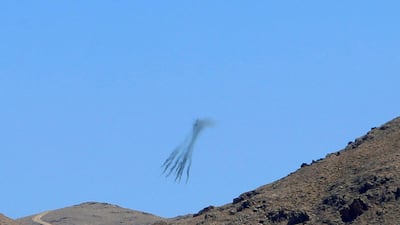The Lebanese army announced on Saturday it had begun ground operations to oust ISIL fighters from positions near the northern towns of Ras Baalbek and Qaa.
An army spokesman told The National that estimates put the number of ISIL fighters in the area at about 600.
Also on Saturday, media outlets affiliated with Hizbollah reported that the group was moving on ISIL positions from the Syrian side of the border with support from the Syrian army.
The Lebanese army has officially denied any co-ordination with Hizbollah or the Syrian army for the operation against ISIL but it is still likely the groups are in communication.
"I expect LAF (Lebanese Armed Forces) intelligence to maintain contact as needed to make sure that there are no stray rounds heading at the LAF or towards Syria," said Aram Nerguizian, a senior associate focusing on the Middle East with the Burke Chair in Strategy at the Washington-based Center for Strategic and International Studies.
"The LAF’s US and UK partners are tracking a lot of this and they are confident in light of how the LAF is conducting itself thus far."
The Lebanese offensive had been anticipated since Hizbollah cleared an Al Qaeda-linked group from the mountains around the northern city of Arsal, close to Ras Baalbek and Qaa, late last month. Both ISIL and Fatah Tahrir Al Sham, a militant alliance dominated by the Al Qaeda-linked Jabhat Fatah Al Sham, took control of areas around Arsal after briefly overrunning the city in late 2014.
------------------------------
Read more:
Lebanon army says it hit back at ISIL positions after extremists fired artillery that landed in town
Hizbollah strengthens its position in Lebanon with military successes
Hizbollah takes victory lap after defeat of Al Qaeda-linked militants
------------------------------
ISIL and Fatah Tahrir Al Sham took more than two dozen hostages from the Lebanese army and local police forces at that time. Nine soldiers are still missing, and it is thought that ISIL is holding them, if they are still alive.
"We don't know anything about them, if they are dead or alive," added the army spokesman who asked to remain anonymous.
The fighting between Hizbollah and Tahrir Al Sham lasted for about a week and ended with negotiations between the two groups that resulted in a deal that would allow more than 7,000 Syrian refugees and fighters to return to Syria.
But the army spokesman said that there were no civilians living in the area controlled by ISIL, and that negotiations would not take place with the group.
ISIL also threatened to overrun Ras Baalbek and Qaa in 2014, and claimed responsibility for striking Qaa with a series of bombings last year that killed five people.
On Saturday, Bashir Matar, a member of the municipal council in Qaa, said residents were happy the operation had finally begun but also wary of retaliation.
“There are fears of bombings and infiltration by militants to carry out operations,” said Mr Matar. “So the eyes will remain open by the security services, the municipal police and the people.”
The offensive against ISIL is the first real test of strength for the Lebanese army in 10 years. The last one was against militants who had taken refuge in Nahr Al Bared, a Palestinian refugee camp in northern Lebanon. That fight, which began in May 2007, lasted more than four months, killed more than 168 Lebanese soldiers and more than 200 militants, almost completely destroyed the camp and displaced around 30,000 people.
The army spokesman said fears of a repeat of that debacle were unfounded.
“Nahr Al Bared was urban fighting, this is a conventional war,” he said.
For the ISIL campaign, the Lebanese army will be backed by air support in the form of US-supplied Cessna planes equipped with Hellfire missiles which belong to the Lebanese air force. Lebanon has received more than US$1 billion (Dh3.7bn) in US military aid since the fighting in Nahr Al Bared, though Hizbollah’s closeness to the Lebanese government has led some American lawmakers to call for cuts to such assistance.
------------------------------
Read more:
Washington shows armour-plated confidence in Lebanese army
US Congress prepares to introduce three bills against Hizbollah
Trump meets Hariri: Hizbollah is a menace for Lebanon and whole region, says US president
US warns of Hizbollah's increasing reach in Syria, Iraq and Yemen in annual report
------------------------------
The US state department has suggested that Washington could next year pull the plug on its military aid to Lebanon altogether. During the fighting around Arsal, the Lebanese army provided a cordon around Hizbollah’s area of operations to prevent militants from escaping the battlefield. It also provided artillery support for that operation.
Last week, however, Lebanon became only the second country in the world to receive delivery of US-made Bradley armoured personnel carriers.
At the time, Mr Nerguizian, who closely follows the Lebanese military, told The National this reflected the level of trust the United States has in the Lebanese Armed Forces (LAF).
The army spokesman and Mr Nerguizian said the army was prepared to carry out the operation against ISIL without support from the US, though it was still in a position to request it.
“The LAF has significant holdings of 155mm artillery ammunition already in country,” said Mr Nerguizian.
“What really matters is that in the event of a major conflict with far higher ammunition ‘burn’ rates, the LAF is in a position to draw on US regional stocks if it had to.”
* With additional reporting from Reuters and Associated Press

